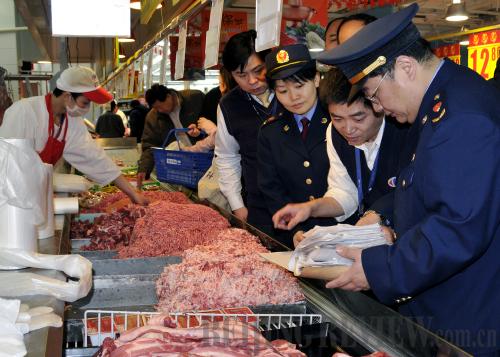|
 |
|
SAFETY CONCERN: Food safety regulators inspect an outlet of Carrefour in Beijing in February (XINHUA) |
Miracle or Tragedy?
After 115 miners were rescued from the flooded Wangjialing coal mine in Shanxi Province earlier this month, Luo Lin, Director of State Administration of Work Safety, said the rescue had created two miracles: One was the survival of workers who had been trapped underground for eight days and nights before being rescued and the other the rescue process itself.
The rescued miners are the luckiest of the lucky—but let's first ponder solutions to, fundamentally and systematically, the issue of "bloody coal" before we celebrate a miracle.
In September 2009, Fang Junshi, head of the Coal Department of National Energy Administration, said China's coal production accounts for the world's 37 percent but the death toll in mine incidents made up 70 percent or so. To produce a million tons of coal, the death rate in China is 30-50 times greater than the United States'. From 2004 to 2006, the rates in Britain and Australia were zero.
Apart from technical and management problems, local governments' worship of profits and lax supervision should be held accountable. The accident in Wangjialing coal mine, which had killed 36 people as of April 13, would have been avoided if the miners' safety had been put in the first place.
What we are eager for is the miracle of "zero mine incidents."
Yangcheng Evening News
Are the Assets Legal?
Zhang Li, Director of the Urban Planning Bureau of the Tianxin District in Changsha, central China's Hunan Province, declared personal assets on April 6. These included five apartments, two cars, shares worth more than 100,000 yuan ($14,641) and a 30,000-yuan ($4,392) deposit in a bank.
The declaration was made after an online post accused Zhang of having accrued a huge quantity of suspicious wealth. Zhang told local Xiaoxiang Morning Herald the content of the post was fictional and he had been framed.
Willing or not, Zhang has become the first official in Changsha to make an asset declaration. Since China has not introduced compulsory asset declaration rules for government officials, the forced declaration in itself is significant.
On the other hand, it is doubtful how Zhang could afford five apartments and other assets solely on the basis of his salary. Although the legitimacy of his assets has not been questioned by any authorities, their aggregate value is obviously too large to be justified.
The basic target of official asset declaration rules is to combat corruption and guarantee healthy operation of government powers, under public supervision. So, since Zhang has published his assets, the authorities should take action as soon as possible to verify if they are clean or not. Only in this way can the basic target of the official rules be realized.
The Beijing News
Unconvincing Statistics
The Information Office of the Ministry of Agriculture recently issued the result of its first farm produce safety monitoring. The qualification rates for vegetables, livestock, poultry and aquatic products are respectively 95.4 percent, 99.4 percent and 96.2 percent. The conclusion is China's farm produce is still very safe.
But online surveys show the public has not taken in the good news. Instead of joy and gratitude, they are tending to doubt the results. They don't accept the published statistics, and are asking about their sources. Are they the first-hand numbers directly obtained by the ministry or have they been reported by local governments? This is not the first time that the public has shown disbelief in official statistics.
Even if the statistics are a first-hand, the public still feels doubtful. The qualification rate for vegetable is 95.4 percent, so the safety of 4.6 percent of sold vegetables is questionable. Suppose every day 300 million people in China need to buy vegetables, then 14 million people will get contaminated vegetables. Isn't this bad enough? Even if a person only runs into such vegetables once in 10 years, the consequences are terrible, let alone the chances of doing it 10 times in a year. Shall we be thankful for a 95.4 percent qualification rate?
The qualification rate is an average number. What the public hopes to see is detailed information on the qualification of different kinds of farm produce in different markets and in different regions. Obviously, consumers have the right to know about this. The government also needs to take tougher actions to ensure food safety.
Yanzhao Evening News
Networks Rule
The first Forum on Female College Students in Guangzhou published the result of a sample survey, which said most respondents believe what changes one's fate is neither knowledge nor appearance, but interpersonal networking, followed by good fortune and individual effort.
The idea of trying to change one's fate through social networking is no longer fresh news and remains an unavoidable topic in many cases. It's natural for everyone to think about asking for help from friends and relatives when they face thorny problems.
In the past, we have repeatedly stressed the importance of knowledge in changing one's fate, but nowadays, social networking seems to have overtaken it. In a word, some ideas that were thought to be shameful are now very popular.
For example, the survey found most female college students felt anxious and almost 60 percent of them hoped their future husbands would be offspring of wealthy families. They even believe it's more important to find a good husband than to work hard.
The biggest unfairness is the inequality in opportunities. Young college students feel especially strongly about this. When social relationships and fortune became decisive factors in changing one's fate, no one will feel comfortable and open about life.
China Youth Daily | 